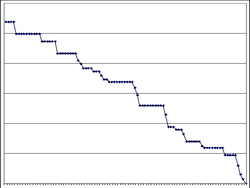 This is what I said to open an all day creative exercise with our leadership team, and founder (Debbie) focused on our long term future…
This is what I said to open an all day creative exercise with our leadership team, and founder (Debbie) focused on our long term future…
The most important thing I have to say is Debbie and I have talked about this and we give you complete permission to let go of the day to day. We’ve given ourselves this one day out of 261 work days in a year to think about the future. Monday we can get back to the work of operating Stride.
As for today, I hope we make this a safe space. Your feelings are yours and you have a right to them. Your dreams are yours and you have a right to them. To borrow from open space. “The people who are here are the right people. Whatever happens today is the only thing that could.”
In terms of outcomes, today is an exercise in collective imagination. Everything we create here will be documented. We will share it with Striders. We will spend the next 3-6 months learning from them how to connect our plans to their aspirations. Ultimately I want every Strider to be able to use our vision to find more meaning in their day to day work.
This work is a piece along with our 2022 goals and the work you’re doing to mature our sales and consulting strategies. When we plan 2023 we will have the information we need to set meaningful and measurable long range goals and iterate on our corporate strategy.
Any questions on the outcomes or the day?
I want to talk about setting an intention. How much it guides our actions.
2035 is 14 years from now. 2007 is 14 years ago. In 2007, I was VP Eng at Oxygen Cable.
I’d been there eight years and we’d built a high performing Agile team: product, engineering and design. Our CEO had just started to work with us as product owner on a line of consumer software. She was looking to recapture her original mission to become a content brand for women.
Our first attempt was a kind of Pinterest two years before Pinterest. We were in beta and then over a weekend Oxygen was acquired. They new owner wanted the audience and carriage. But they didn’t want the mission.
It was pretty inevitable how things were going to play out. My team was scouted as individuals, each assigned separate transition responsibilities. I spent a decent amount of time writing down what I thought about the experience and laying out what I cared about.
About the acquisition process, I said:
We haven’t been rewarded or treated as one (team) but as individuals in service of organizations. A focus on citizens and cities – not neighborhoods.
What is difficult for the integrators to discern are the values, practices, spirit and reputation that allow this team to attract and develop new talent even as individuals move on.
About building software I wrote:
You can optimize construction practices as much as you want but if there is no discernible need for what you’re building…
The goal is not to build crap well. It is to find a way each day to do less and less crap and more and more not crap.
Ethical behavior is not about being right or infallible.
Human judgment is fallible but we must act to create the most benefit and least harm in accordance with the principle that others have as much right to joy, fulfillment and dignity as we do ourselves.
If harm results from even our best efforts we must take responsibility. No one is perfect and there are always mitigating circumstances but there are also no excuses.
Finally, I wrote this personal manifesto:
In my decisions and actions, I balance the following:
- I care about the people who use what I create.
- I care about the quality of what I create.
- I care about the people with whom I create.
- I honor my commitments to my employer.
- I am loyal to people who have earned my loyalty.
- I provide for my family.
I reflect on my decisions and actions to avoid:
- negligence,
- incompetence,
- deception,
- waste, and
- harm.
Agile practice is a means to these ends.
Putting out what I cared about and what I wanted to create in the world influenced my actions and shaped my career. It became the filter with which I made decisions, informed what I learned and who I sought out to learn from. It guided my interactions with co-workers, what work I was willing to take, and with whom I built working relationships.
It’s why I met Debbie. It’s why I hired her prior company and then Stride. It’s why I joined Stride. It’s why I challenged fundamental assumptions about our business. And it’s why I’d chosen to work for someone who cared enough about Striders to listen to me and take a risk with all of us.
We have been handed the opportunity to make decisions with a broader frame of reference and longer timeline. And we can move more quickly because we have each other.
Even still, it can as long as it takes. Because the incremental steps are worth it and the journey is worth it. It’s worth it to live true to the vision, values and people you care about. To see a future that is better than the present and to work for it together.
Stride will evolve along with us. It will continue to attract inspiring people to work with us and rise to meet our aspirations to achieve our life goals, make a contribution to society, and help improve conditions on our planet.


